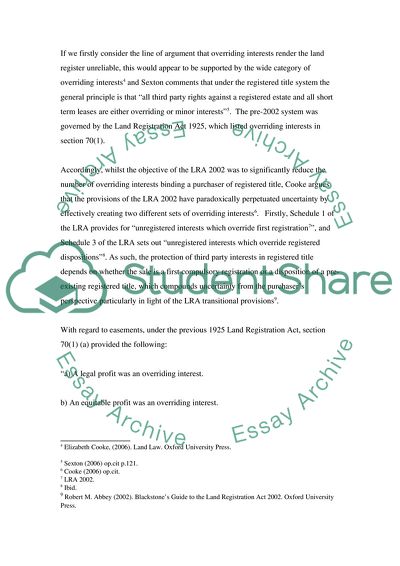Cite this document
(The Statutory Provisions in the Land Registration Act Coursework, n.d.)
The Statutory Provisions in the Land Registration Act Coursework. Retrieved from https://studentshare.org/law/1721555-explain-the-extent-to-which-you-consider-that-the-statutory-provisions-relating-to-overriding-interests-and-their-interpretation-by-the-courts-are-a-crack-in-the-mirror-of-title-to-registered-land-do-they-undermine-the-reliability-of-the-land-registe
The Statutory Provisions in the Land Registration Act Coursework. Retrieved from https://studentshare.org/law/1721555-explain-the-extent-to-which-you-consider-that-the-statutory-provisions-relating-to-overriding-interests-and-their-interpretation-by-the-courts-are-a-crack-in-the-mirror-of-title-to-registered-land-do-they-undermine-the-reliability-of-the-land-registe
(The Statutory Provisions in the Land Registration Act Coursework)
The Statutory Provisions in the Land Registration Act Coursework. https://studentshare.org/law/1721555-explain-the-extent-to-which-you-consider-that-the-statutory-provisions-relating-to-overriding-interests-and-their-interpretation-by-the-courts-are-a-crack-in-the-mirror-of-title-to-registered-land-do-they-undermine-the-reliability-of-the-land-registe.
The Statutory Provisions in the Land Registration Act Coursework. https://studentshare.org/law/1721555-explain-the-extent-to-which-you-consider-that-the-statutory-provisions-relating-to-overriding-interests-and-their-interpretation-by-the-courts-are-a-crack-in-the-mirror-of-title-to-registered-land-do-they-undermine-the-reliability-of-the-land-registe.
“The Statutory Provisions in the Land Registration Act Coursework”, n.d. https://studentshare.org/law/1721555-explain-the-extent-to-which-you-consider-that-the-statutory-provisions-relating-to-overriding-interests-and-their-interpretation-by-the-courts-are-a-crack-in-the-mirror-of-title-to-registered-land-do-they-undermine-the-reliability-of-the-land-registe.


